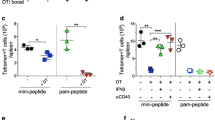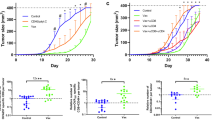Abstract
Dendritic cells derived from monocytes cultured in the presence of type I interferon were found to induce efficient T cell responses against tumor antigens in vitro. We vaccinated eight stage III or IV melanoma patients with dendritic cells generated with interferon-β and interleukin-3, activated by poly I: C, and pulsed with the tumor-specific antigen NA17.A2. This dendritic cell vaccine was well-tolerated with only minor and transient flu-like symptoms and inflammatory reactions at the injection sites. In most patients, isotopic imaging documented dendritic cells (DC) migration from the intradermal injection site to the draining lymph nodes. Finally, mixed lymphocyte-peptide culture under limiting dilution conditions followed by tetramer labeling indicated that three out of eight patients mounted a CD8 T cell response against the NA17.A2 antigenic peptide. We conclude that DC generated in type I-IFN represent an interesting alternative to DC generated in IL-4 and GM-CSF for cancer immunotherapy.

Similar content being viewed by others
References
Banchereau J, Palucka AK, Dhodapkar M et al (2001) Immune and clinical responses in patients with metastatic melanoma to CD34(+) progenitor-derived dendritic cell vaccine. Cancer Res 61:6451–6458
Berzofsky JA, Terabe M, Oh S et al (2004) Progress on new vaccine strategies for the immunotherapy and prevention of cancer. J Clin Invest 113:1515–1525
Blocklet D, Toungouz M, Kiss R et al (2003) 111In-oxine and 99mTc-HMPAO labelling of antigen-loaded dendritic cells: in vivo imaging and influence on motility and actin content. Eur J Nucl Med Mol Imaging 30:440–447
Buelens C, Bartholome EJ, Amraoui Z et al (2002) Interleukin-3 and interferon beta cooperate to induce differentiation of monocytes into dendritic cells with potent helper T-cell stimulatory properties. Blood 99:993–998
Coulie PG, Karanikas V, Colau D et al (2001) A monoclonal cytolytic T-lymphocyte response observed in a melanoma patient vaccinated with a tumor-specific antigenic peptide encoded by gene MAGE-3. Proc Natl Acad Sci USA 98:10290–10295
Cranmer LD, Trevor KT, Hersh EM (2004) Clinical applications of dendritic cell vaccination in the treatment of cancer. Cancer Immunol Immunother 53:275–306
de Vries IJ, Krooshoop DJ, Scharenborg NM et al (2003) Effective migration of antigen-pulsed dendritic cells to lymph nodes in melanoma patients is determined by their maturation state. Cancer Res 63:12–17
Detournay O, Mazouz N, Goldman M, Toungouz M (2005) IL-6 produced by type I IFN DC controls IFN-gamma production by regulating the suppressive effect of CD4+ CD25+ regulatory T cells. Hum Immunol 66:460–468
Figdor CG, de Vries IJ, Lesterhuis WJ, Melief CJ (2004) Dendritic cell immunotherapy: mapping the way. Nat Med 10:475–480
Gjertson DW, Terasaki PI. HLA (1998) American Society for Histocompatibility and Immunogenetics, pp 190–191
Godelaine D, Carrasco J, Lucas S et al (2003) Polyclonal CTL responses observed in melanoma patients vaccinated with dendritic cells pulsed with a MAGE-3.A1 peptide. J Immunol 171:4893–4897
Guilloux Y, Lucas S, Brichard VG et al (1996) A peptide recognized by human cytolytic T lymphocytes on HLA-A2 melanomas is encoded by an intron sequence of the N-acetylglucosaminyltransferase V gene. J Exp Med 183:1173–1183
Hung K, Hayashi R, Lafond-Walker A, Lowenstein C, Pardoll D, Levitsky H (1998) The central role of CD4(+) T cells in the antitumor immune response. J Exp Med 188:2357–2368
Karanikas V, Lurquin C, Colau D et al (2003) Monoclonal anti-MAGE-3 CTL responses in melanoma patients displaying tumor regression after vaccination with a recombinant canarypox virus. J Immunol 171:4898–4904
Lapenta C, Santini SM, Logozzi M et al (2003) Potent immune response against HIV-1 and protection from virus challenge in hu-PBL-SCID mice immunized with inactivated virus-pulsed dendritic cells generated in the presence of IFN-alpha. J Exp Med 198:361–367
Lonchay C, van der BP, Connerotte T et al (2004) Correlation between tumor regression and T cell responses in melanoma patients vaccinated with a MAGE antigen. Proc Natl Acad Sci USA 101(suppl 2):14631–14638
Mailliard RB, Wankowicz-Kalinska A, Cai Q et al (2004) alpha-type-1 polarized dendritic cells: a novel immunization tool with optimized CTL-inducing activity. Cancer Res 64:5934–5937
Mazouz N, Detournay O, Buelens C et al (2005) Immunostimulatory properties of human dendritic cells generated using IFN-beta associated either with IL-3 or GM-CSF. Cancer Immunol Immunother
Morse MA, Coleman RE, Akabani G, Niehaus N, Coleman D, Lyerly HK (1999) Migration of human dendritic cells after injection in patients with metastatic malignancies. Cancer Res 59:56–58
Paczesny S, Banchereau J, Wittkowski KM, Saracino G, Fay J, Palucka AK (2004) Expansion of melanoma-specific cytolytic CD8+ T cell precursors in patients with metastatic melanoma vaccinated with CD34+ progenitor-derived dendritic cells. J Exp Med 199:1503–1511
Pardoll D, Allison J (2004) Cancer immunotherapy: breaking the barriers to harvest the crop. Nat Med 10:887–892
Parlato S, Santini SM, Lapenta C et al (2001) Expression of CCR-7, MIP-3beta, and Th-1 chemokines in type I IFN-induced monocyte-derived dendritic cells: importance for the rapid acquisition of potent migratory and functional activities. Blood 98:3022–3029
Pasare C, Medzhitov R (2003) Toll pathway-dependent blockade of CD4+CD25+ T cell-mediated suppression by dendritic cells. Science 299:1033–1036
Renneson J, Salio M, Mazouz N, Goldman M, Marchant A, Cerundolo V (2005) Mature dendritic cells differentiated in the presence of interferon-beta and interleukin-3 prime functional antigen-specific CD8 T cells. Clin Exp Immunol 139:468–475
Rouas R, Lewalle P, El Ouriaghli F, Nowak B, Duvillier H, Martiat P (2004) Poly(I:C) used for human dendritic cell maturation preserves their ability to secondarily secrete bioactive IL-12. Int Immunol 16:767–773
Santini SM, Lapenta C, Logozzi M et al (2000) Type I interferon as a powerful adjuvant for monocyte-derived dendritic cell development and activity in vitro and in Hu-PBL-SCID mice. J Exp Med 191:1777–1788
Thurner B, Haendle I, Roder C et al (1999) Vaccination with mage-3A1 peptide-pulsed mature, monocyte-derived dendritic cells expands specific cytotoxic T cells and induces regression of some metastases in advanced stage IV melanoma. J Exp Med 190:1669–1678
Tosi D, Valenti R, Cova A et al (2004) Role of cross-talk between IFN-alpha-induced monocyte-derived dendritic cells and NK cells in priming CD8+ T cell responses against human tumor antigens. J Immunol 172:5363–5370
Acknowledgements
We thank Ms. C. Van Helleputte and Ms. E. Thille for their expert technical assistance, and Mrs. D. Duriau and A. Manunta for their help in data management. This work was supported by BruCells SA and the government of the Brussels Region.
Author information
Authors and Affiliations
Corresponding author
Rights and permissions
About this article
Cite this article
Trakatelli, M., Toungouz, M., Blocklet, D. et al. A new dendritic cell vaccine generated with interleukin-3 and interferon-β induces CD8+ T cell responses against NA17-A2 tumor peptide in melanoma patients. Cancer Immunol Immunother 55, 469–474 (2006). https://doi.org/10.1007/s00262-005-0056-z
Received:
Accepted:
Published:
Issue Date:
DOI: https://doi.org/10.1007/s00262-005-0056-z




